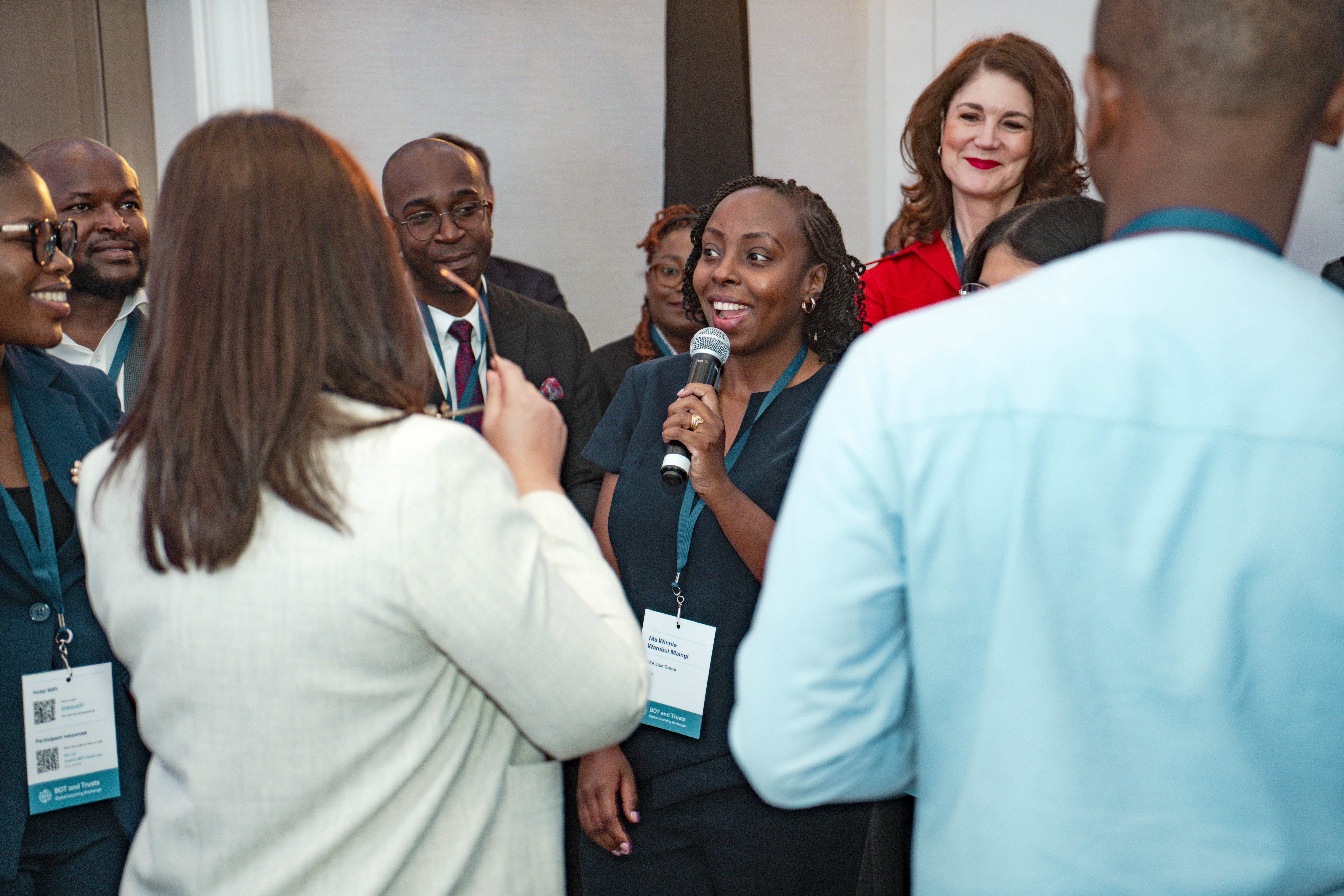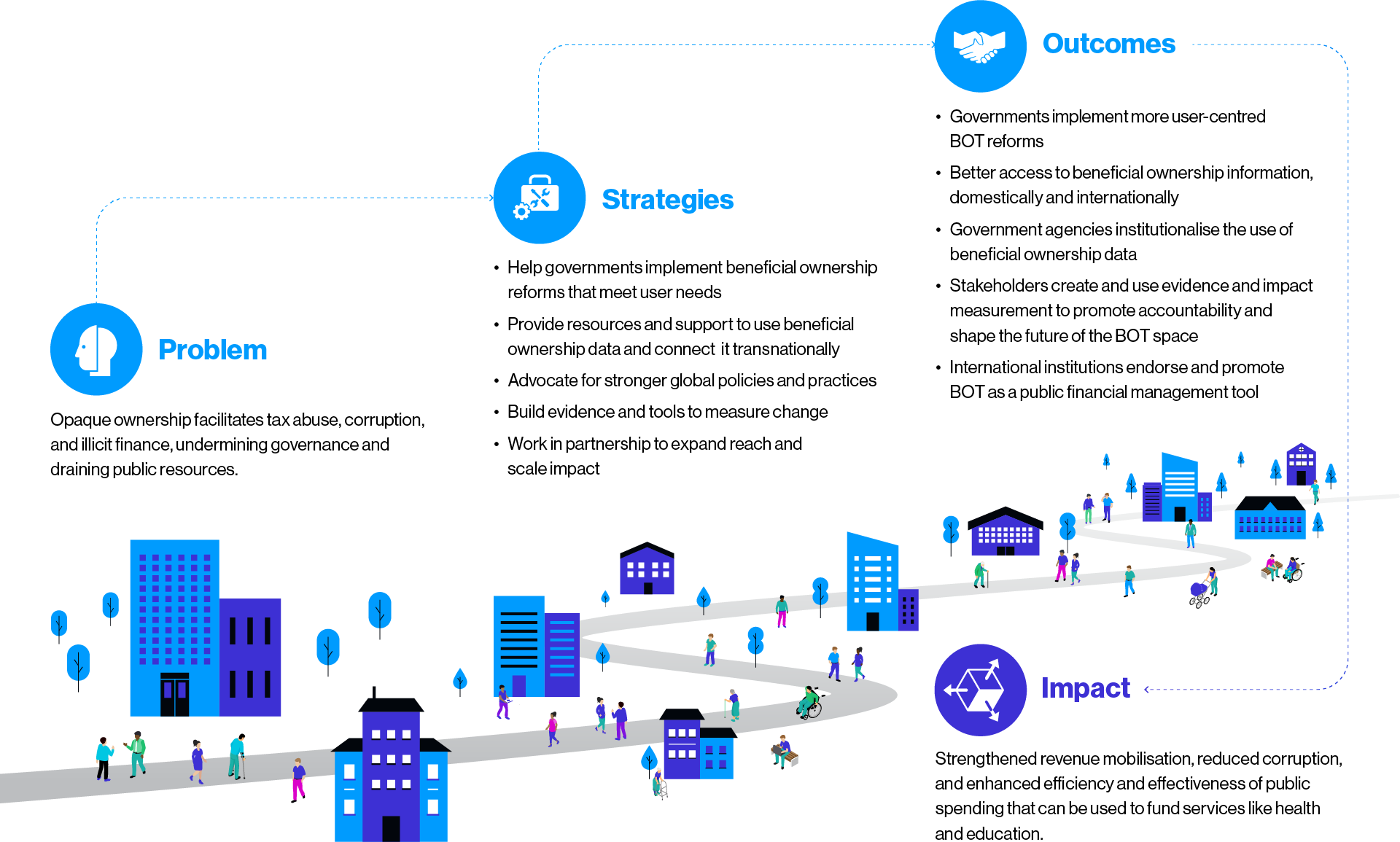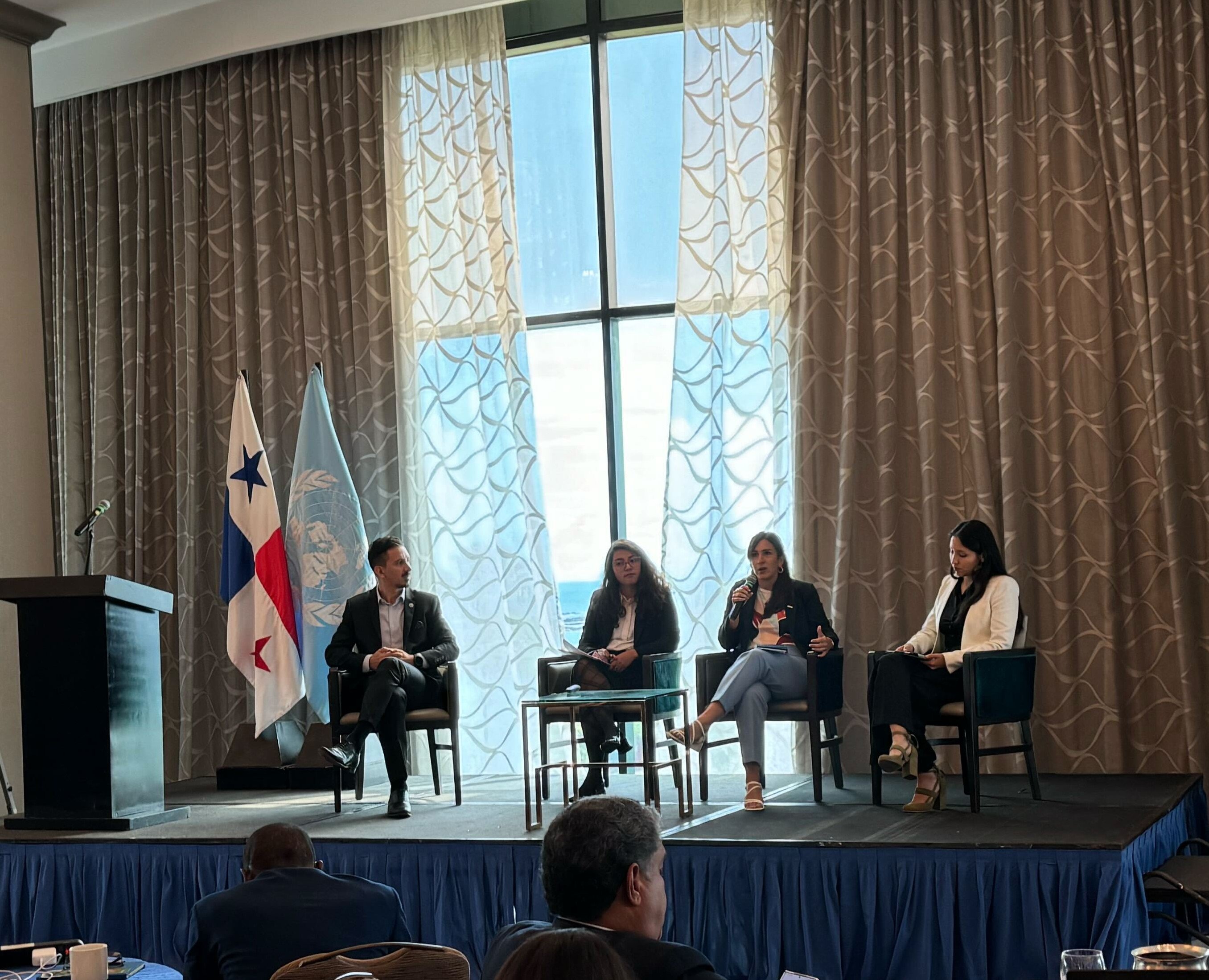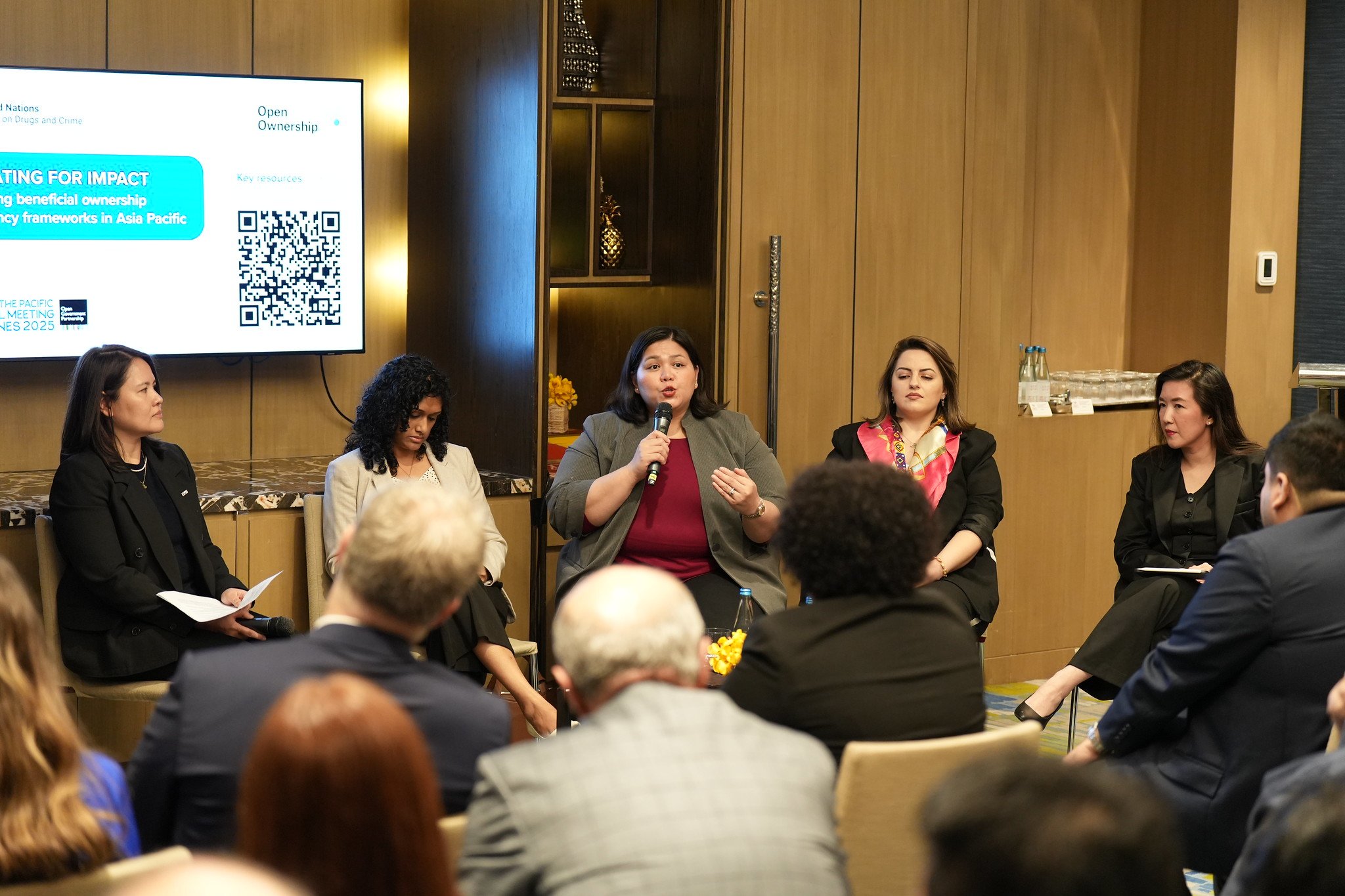From transparency to trust: Open Ownership strategy 2025 to 2030
Our goals and priorities to 2030
OO seeks to mainstream BOT into key international and domestic processes to support public financial management, revenue mobilisation, and the fight against IFFs. OO’s approach builds on its global influence, high-level technical expertise, trusted partnerships, and the impact achieved under our previous four-year strategy. Below, we outline how we will drive systemic change by supporting effective reforms, embedding data use, and influencing global standards.
By 2030, our goal is to embed the use of ownership data within core public financial management systems to measurably improve revenue mobilisation, reduce corruption, and enhance the effectiveness of public spending.

OO’s 2024 workshop on BOT for trusts in 2024 convened representatives from Africa, Asia, Europe, and Latin America to discuss emerging policy questions.
Expected impacts
OO will work toward the following specific, measurable, achievable, relevant, and time-bound outcomes by 2030.
Targets: By 2030...
1. Government agencies design and implement user-centred BOT reforms.
At least 10 countries have implemented more user-centred BOT reforms with OO’s support, and OO’s guidance and resources have been leveraged to support much broader adoption of user-centred approaches to BOT reform in contexts where OO does not directly work.
2. Government agencies in countries where OO works have improved access to timely and reliable domestic and international beneficial ownership information.
Government agencies in at least 6 countries supported by OO gain improved access to beneficial ownership data from domestic and/or foreign sources. There is a strengthened architecture (policy, legal, and technology) to support transnational sharing of data on beneficial ownership networks.
3. Public financial management and anti-corruption agencies institutionalise the use of beneficial ownership data.
At least 6 countries in which OO has provided support will use – or make significant progress to institutionalise the use of – beneficial ownership data in procurement, licensing, or tax oversight processes to prevent financial leakages and support better revenue collection.
4. Stakeholders generate and use stronger evidence and impact measurements to promote accountability and shape the future of the BOT space.
OO will (co-)create at least 10 thought leadership and evidence outputs that directly demonstrate – or practically guide others in demonstrating – the impact of beneficial ownership data use and/or shape the future of the BOT space, and disseminate these in partnership with local and global stakeholders.
5. Regional and global institutions formally recognise and promote BOT and the use of ownership information to strengthen public financial management and/or tackle IFFs.
Beneficial ownership reforms and/or ownership information are recognised as important for strengthening public financial management and/or tackling IFFs in at least 3 global or regional frameworks (e.g. G20, UN, African Union, or FATF), influenced by OO’s policy and advocacy work.
Figure 2. Theory of change 2025–2030

Problem
Opaque ownership facilitates tax abuse, corruption, and illicit finance, undermining governance and draining public resources.
Strategies
- Help governments implement beneficial ownership reforms that meet user needs
- Provide resources and support to use beneficial ownership data and connect it transnationally
- Advocate for stronger global policies and practices
- Build evidence and tools to measure change
- Work in partnership to expand reach and scale impact
Outcomes
- Governments implement more user-centred BOT reforms
- Better access to beneficial ownership information, domestically and internationally
- Government agencies institutionalise the use of beneficial ownership data
- Stakeholders create and use evidence and impact measurement to promote accountability and shape the future of the BOT space
- International institutions endorse and promote BOT as a public financial management too
Impact
Strengthened revenue mobilisation, reduced corruption, and enhanced eciency and effectiveness of public spending that can be used to fund services like health and education.
Download the Theory of change document here.
How we will deliver
OO will support governments to implement BOT reforms that are designed to meet user needs and deliver meaningful policy outcomes, particularly in tackling corruption, tax abuse, and IFFs. Alongside national implementation, we will drive progress in international standards and practices.

In 2024, OO and UNODC co-organised a regional conference on combatting corruption in Latin America and the Caribbean through the use of beneficial ownership information which convened almost 50 officials from across the region.
Supporting user-centred, impact-oriented reforms
Building on our technical expertise, OO will scale up its user-centred approach to BOT reform. This involves holistic design support that spans legal frameworks, institutional processes, and digital systems, centred on the needs of data providers and end-users across government and society.
OO will continue to offer tailored technical assistance that includes:
- legislative and policy advice;
- support to design and implement effective digital systems;
- capacity-building to advance BOT reforms and the use of beneficial ownership data;
- practical tools, resources, and country-specific guidance.
Making beneficial ownership data accessible, usable, and connected
OO will prioritise improving the accessibility and usability of beneficial ownership data. This includes targeted work to:
- strengthen inter-agency data sharing;
- facilitate cross-border exchange of beneficial ownership data;
- ensure beneficial ownership data is structured and shared in formats that support real-world use.
We will also help governments connect beneficial ownership data with other datasets and align data practices with domestic policy goals.
Embedding beneficial ownership data use in key policy areas
To drive lasting change, OO will focus on four high-impact areas: public procurement, anti-corruption, tax, and licensing. We will help stakeholders institutionalise beneficial ownership data use by embedding it in operational mandates and workflows, ensuring sustainability beyond our engagement. We will also partner with regional and international actors to support professional development and policy coherence across jurisdictions.
Driving global learning and evidence-based practice
As a global thought leader, OO will foster cross-sector and cross-country learning to shape the continued evolution of BOT policy and practice. We will invest in new research, impact-measurement methodologies, and learning partnerships with academia, civil society, international organisations, and the private sector.
Working in partnership
As a small team driving systemic change, OO relies on strong, strategic partnerships to scale our impact. Over this strategy period, we will take an even more intentional approach to partnerships. At the national level, partnerships help ensure our work meets local needs, builds on existing efforts, and remains sustainable after we step back, by building local leadership and expertise. While direct support to governments remains central to our work, we know that lasting change requires long-term, trustbased relationships with civil society, business, and international partners. We will deepen these relationships and actively build new ones.
Internationally, partnerships multiply our influence and impact, and enable mutual learning. We will continue to collaborate with multilateral institutions like the World Bank, the International Monetary Fund, and UNODC to contribute to broader governance and anti-corruption agendas. We will build new alliances in specialist domains such as tax, procurement, and academic research. We will also expand our engagement with regional actors, such as the African Union and FATF-style regional bodies, to support cross-border data exchange and promote BOT reform momentum across neighbouring jurisdictions.
Taking an adaptive approach
Because the field of BOT is evolving quickly and the wider world is changing rapidly, we will take an adaptive approach to reaching our 2030 goal. We will not set rigid, fixed targets for each of the five years. Instead, our 2030 goal and broad outcomes will guide our annual plans and longer-term objectives. We will set specific indicators over the time period for which they make sense, and review and adjust them at least once a year to respond to new developments. We will also strengthen our monitoring, evaluation, and learning systems so we can use good data to guide our decisions.
Capturing and measuring Open Ownership’s impact
Measuring the impact of OO’s work is fundamental to ensuring that our efforts lead to the tangible changes we want to see. Our approach is not just about tracking activities but also understanding the systemic changes our work enables and how BOT contributes to broader policy goals, such as revenue generation, reducing corruption, and tackling financial crime.
We have adopted an outcome-based approach that prioritises real-world impact. This ensures we track how our technical assistance, policy guidance, and advocacy contribute to advancing BOT reforms at national, regional, and global levels.
We will strengthen internal data collection mechanisms to systematically track commitments, implementation progress, and measurable outcomes. Our approach will focus on capturing transformational, scalable, and sustainable change by monitoring shifts in policies, behaviours, and governance systems that embed BOT, as well as capturing situations where interventions do not lead to the expected impacts. This will help us to understand what is going wrong and facilitate the necessary adaptations. Engaging stakeholders for feedback on OO’s interventions will support our work to assess the impact of BOT reforms, and assist in demonstrating impact through storytelling – using stakeholders’ stories of change backed by data and qualitative insights, we will communicate results to donors, partners, and stakeholders.
We will track commitment and implementation progress through structured tools, ensuring that government pledges and policy shifts are monitored systematically. By developing stakeholder engagement action plans, we will provide insight into commitments made by key actors, such as government agencies, civil society, and businesses, allowing us to assess their follow-through. Evaluation tools, including pre- and post-engagement questionnaires, follow-up assessments (3-6 months post-training or technical assistance intervention), and stakeholder surveys, will be used to measure changes in knowledge, attitudes, and actions resulting from OO’s technical assistance and policy resources. This includes capacity-building programmes, policy and advisory support to governments, and OO-developed resources such as country-specific tools and guidance materials.
Outcome mapping will further document OO’s influence within the broader governance and policy landscape, assessing where our technical assistance and advocacy have led to tangible impact.

During the 2025 Open Government Partnership Asia and the Pacific Regional Meeting, OO organised a side event which convened experts from Armenia, Philippines, and Sri Lanka to discuss establishing BOT frameworks in the region.
Finances and fundraising
Over the last decade, OO has grown from a start-up to an established organisation with revenues of around USD 4 million per year. This has enabled us to build a team with deep expertise and to deliver impactful support to around 40 countries to advance BOT reforms, and shape international standards and practices.
To deliver the ambition of this strategy will require new and additional resources, targeting key high-impact areas. Balancing the significant scale of investment that is required to deliver on our mission in full, with recognition of the pressures at play in the fundraising landscape, we want to achieve a modest pace of growth throughout the strategic period – allowing OO to incorporate the additional expertise and resources required to deliver effectively, while ensuring operations remain stable and sustainable.
In order to deliver this strategy, we anticipate an annual expenditure of USD 4,000,000 for the first year of the cycle (FY24/25), gradually increasing to USD 6,000,000 by the final year of the cycle (FY29/30).
As a donor-funded organisation, OO will create clear value propositions to achieve measurable impacts in line with our strategy, and seek synergistic relationships with donors across the spectrum of multilateral agencies, bilateral donors, and private and corporate philanthropies to make impact investments that support our strategy. However, to retain our sustainability through an expected period of change in the funding landscape – such as increased pressure on official development assistance budgets – we will take intentional action to diversify our business model. This is expected to include an exploration of the following:
1. Increasing earned income
We will explore proactively growing this revenue stream where there is good alignment between contract opportunities and OO’s strategic goals, leveraging OO’s established track record of delivering contracted project work.
2. Exploring new models to partner with governments to deliver donor-funded interventions
Market indicators suggest there may be significant opportunities to work in partnership with donor agencies and implementing governments to innovate new models of delivering BOT reforms, such as directly funding implementation teams embedded within government agencies or building domestically financed interventions.
3. Expanding grant income to partner with donors engaged in a broader range of policy agendas
With the expansion of OO’s work to support BOT as a tool for effective public financial management, our work becomes aligned with donors (private and public) seeking to support progress in areas beyond OO’s core focus to date, including effective taxation, digital public infrastructure, sustainable climate financing and locally driven development.
4. Securing impact investment to finance measurable social returns
The increased focus on measuring the impact of BOT and the use of beneficial ownership data, creates new opportunities to seek impact investments to deliver specific programmatic interventions that generate measurable social or economic returns (e.g. applying beneficial ownership information in tax audits to identify unpaid tax and deliver measurable improvements in tax revenues).